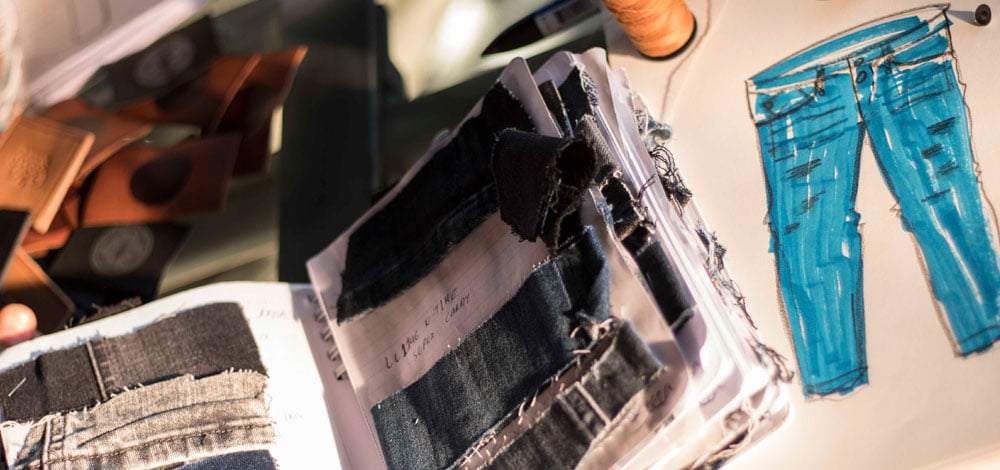The importance of material in jeans

Every year, 2.3 billion pairs of jeans are sold worldwide, including 63 million in France. However, this wardrobe staple that we've loved wearing for years is also one of the world's most polluting. The production of one pair of jeans requires 4,000 liters of water, and a pair of denim pants travels around 65,000 km before reaching the consumer. Not to mention a lifespan of just four years. To reconcile style, sustainability and ecological convictions, many brands are reinventing denim, offering eco-friendly alternatives to this wardrobe staple.
Focus on Eco-Responsible Materials
A quick reminder: materials are called “eco-friendly” when they require fewer natural resources, consume less energy, and are recycled or recyclable. Various labels, such as Oeko Tex 100 or ECO Friendly Factory, certify that a pair of jeans is eco-responsible, allowing you to choose a more environmentally friendly option with confidence.
Organic Cotton and Recycled Cotton
Cotton is a robust plant-based material widely used in denim production. Its cultivation generates nearly 350 million jobs worldwide. Cotton helps reduce food insecurity by providing a stable monetary income for many farming families globally.
However, conventional cotton farming is highly polluting, consuming large amounts of water and requiring numerous insecticides and herbicides for its production.
To make jeans more sustainable, it was crucial and urgent to find less polluting fibers than traditional cotton. The most committed brands have made significant strides by offering recycled cotton, which is often blended with conventional and organic cotton. This alternative allows for reduced water consumption and fewer toxic substances, presenting a lower carbon footprint compared to conventional cotton.
The brand Le Temps des Cerises supports more responsible cotton cultivation with a collection of organic cotton jeans for both men and women.
Linen, Hemp, and Kapok
There are other sustainable and durable fibers increasingly used in denim production, including linen and hemp. These require very little water and pesticides for cultivation, reducing their environmental impact compared to cotton.
Kapok is a natural plant fiber derived from the fruits of a tree found in South America. Also known as vegetable wool, this lightweight and elastic fiber is a promising alternative to cotton, consuming much less water. Kapok is already used by many designers in their clothing designs.
In addition to their low ecological footprint, these green materials are gaining popularity in the denim industry due to their numerous environmental benefits and their durability in creating quality jeans.
Recycled Polyester
Polyester is an elastic, wrinkle-free, durable, and easy-to-maintain material. It is often used in the manufacture of jeans, but unfortunately, it remains highly polluting, as it is made from petroleum.
Recycled polyester made from plastic bottles, on the other hand, reduces petroleum usage and waste production. It helps avoid the unnecessary production of highly polluting polyester and prevents soil and water pollution related to the release of microplastic particles.
Moreover, its ease of maintenance reduces the number of washes, the cleaning temperature, and the use of an iron, thereby diminishing the environmental impact.
The Impact of Material on the Longevity of Jeans
The longevity of denim jeans is strongly influenced by the raw material used, especially when it comes to eco-responsible materials. Fibers like organic cotton, linen, and hemp, due to their natural robustness, contribute to the durability of the garment.
These materials allow for the production of jeans that are more resistant to wear and washing, thus extending their lifespan. By investing in eco-responsible materials, jean manufacturers not only reduce environmental impact but also increase the lifespan of their products, providing consumers with clothing that remains in good condition for longer, thereby reducing overproduction, waste, and contributing to more sustainable fashion.
Innovative Materials: The Future of Jeans
Upcycling, like second-hand practices, is an emerging eco-responsible trend. It aims to enhance worn objects and materials, transforming waste into raw materials to combat wastefulness.
In the fashion and denim sectors, upcycling is widely utilized. Various brands are committed to making jeans more eco-friendly through this approach. They recycle different waste materials to transform them into jeans, such as plastic bottles. These bottles, once crushed and converted into threads, are used in denim production. However, to ensure optimal quality and durability of denim pants, this material often constitutes only a small part of the final jeans.
Some players in the textile sector are exploring innovative eco-responsible initiatives. The Japanese brewery Sapporo Breweries, located in Hokkaido, collaborated in 2022 with Shima Denim Works to produce jeans made from malt and hop waste. Shima Denim Works, already known for producing clothing from bagasse (sugarcane residue), transformed the brewing waste into washi, a paper that was then spun and woven to create limited edition denim. The potential to valorize certain waste materials for the production of denim clothing is therefore very encouraging and well-established!

